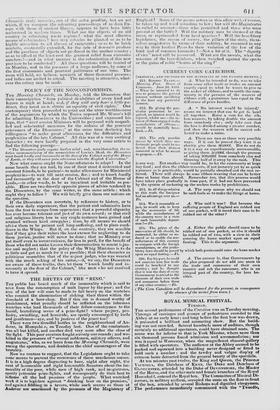POLICY OF THE NONCONFORMISTS.
THE Morning Chronicle, on Monday, told the Dissenters that their emancipation " from political disabilities of every kind and ilegree is nigh at band; and, if they will only have a little pa- tience. they must soen obtain an equality of civil lights." Our contemporary then proceeded to point out the utter worthlessness of the arguments by which the Tories opposed Mr. WOOD'S bill for admitting Dissenters to the Universities ; and expressed his hope, that "next session Ministers will be prepared with unquali- fied and substantial measures for the redress of the practical grievances of the Dissenters ;" at the same time declaring his willingness "to make great allowances for the difficulties and perplexities of the late Cabinet." All this was of a very soothing character : we were hardly prepared in the very same article to find the following passage— "The Dissenters justly require further relief; and, notwithstanding the se- dative recommendation of the memorialists of Lewin's Mead, the Dissenters must knock loudly and incessantly at the door of the Cabinet and of the House of Lords, or they will never gain admission into the English Universities."
Now what course ought the Nonconformists to adopt? In the same breath they are told, by one of their most d.sinterested and constant friends, to be patient—to make allowances for Ministerial perplexities—to wait till next session, &c.; and to knock loudly and incessantly at the door of the Cabinet and of the House of Lords,—in other words, to be as impatient and irritable as pos- sible. Here are two directly opposite pieces of advice tendered to the Dissenters, by the same writer, in the same article : which ought they to follow ? We will briefly give them our notions on the question. If the Dissenters can ascertain, by reference to history, or to their own daily experience, that the patient and submissive have been the first to escape from oppression; that a powerful oligarchy Juts ever become tolerant and just of its own accord; or that civil and religious liberty has in any single instance been gained and retained without hard struggles; then, by all means we should advise them to be patient and long-suffering, and to place confi- dence in the Whigs. But if, on the contrary, they are sensible that if they give their rulers the least excuse ffir neglecting to do them justice, justice will never be done; that no Ministry ever put itself even to inconvenience, far less in peril, for the benefit of those who did not make known their determination to resent iojus- tice and neglect ; that the policy of the Whig Ministers is ta do as little and get as much for it as possible; that their character as politicians resembles that of the unjust judge, who was wearied with the much asking of his suitor,—if, we say, the Dissenters are aware of these truths, then let. them " knock loudly and in- cessantly at the door of the Cabinet," like men who are resolved to have it opened.






















 Previous page
Previous page